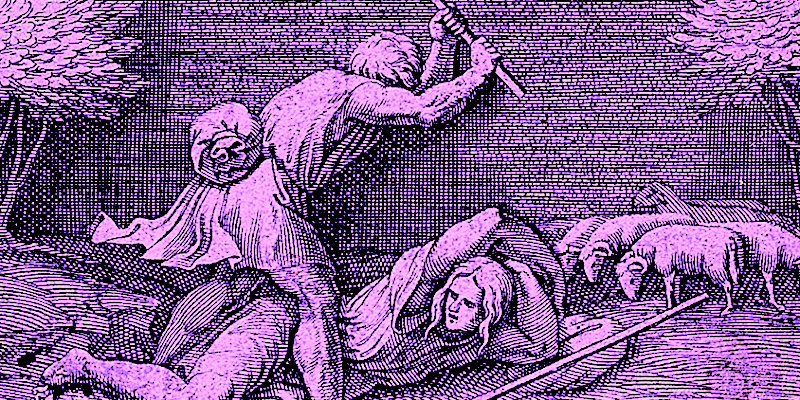Quick quiz: What’s the first crime committed in the Bible?
And no, it’s not Cain murdering his brother Abel out of jealousy, though that definitely ranks up there.
The first crime, I would argue, is when Eve gets blamed for violating God’s instructions—and she gets all the blame, even though Adam is equally—and perhaps even more—guilty than she is.
The first Letter to Timothy, written in Paul’s name, repeatedly declares that women should keep silent in his Church, and not preach to the men, “For Adam was created first, and Eve afterwards; moreover, it was not Adam who was deceived; it was the woman who, yielding to deception, fell into sin” (1 Timothy: 2:13-14).
Right. Let’s subjugate women for the next 2,000 years based on a highly selective reading of a few sentences in Genesis 1-3.
Ladies and gentlemen of the jury, Eve has been charged with the crime of being inferior due to her status of being “created after” and of bringing sin into the world. And yet Exhibit A, chapter 1 of Genesis, clearly states that man and woman were made at the same time, several verses after the creation of “creeping things.” So if coming later in Creation is a sign of inferiority, what do we do with Genesis 1, which places the creation of humans after that of insects?
Exhibit B: OK, so we’re going to ignore Genesis 1 and focus exclusively on Genesis 2-3, which is the better-known version, after all, where Adam is made first, and Eve later (from part of his side), but here’s the rub: If you’re going to privilege this version, Eve does not exist yet when God tells Adam not to eat the fruit from the Tree of Life. Adam hears the prohibition directly from God. Eve apparently hears about it from Adam sometime after the fact, but this conversation is not recorded in the pages of the Bible. What does happen, when Eve decides to eat the fruit, is that her husband is apparently standing right there next to her, not saying a word about how maybe this is a bad idea, since God kind of said not to do it.
The problem is that two-thirds of the exculpatory evidence in Eve’s favor is in ancient Hebrew. In modern English, we get the weakest third: “So she took some and ate it; she also gave some to her husband, and he ate it” (Gen. 3:6), which certainly suggests that he’s standing nearby. But there is a Hebrew word in the biblical text, which is pronounced something like imahu (my ancient Hebrew is pretty spotty), meaning “with her.” So a more accurate translation would be, “she also gave some to her husband with her, and he ate it.” Sure sounds like he’s standing right there, doesn’t it? Most persuasive of all is that the serpent is speaking in plural verbs, which no longer exist in English, but the serpent is clearly talking to more than one person, and there’s only one other human on the planet according to the text, and he’s the one who heard the prohibition straight from God’s mouth, so arguably Adam is the bigger sinner. Yet he gets a pass—not from God, who does punish him, but from Western civilization, for want of a better term. Two thousand years of patriarchy follow, and it’s all based on… um, lies and distortions.
Surprisingly, the ultra-Orthodox Artscroll Chumash is the only English translation I’ve ever seen that includes the words “with her” in Gen. 3:6.
Another crime occurs in the violent and chaotic era of the Judges, when a completely innocent woman suffers from a man’s mistakes is when Jephthah, a warrior, makes a vow before God that if he is victorious against the Ammonites in battle, “then whatever comes out of the door of my house to meet me on my safe return [shall] be offered by me as a burnt offering to the Lord” (Judges 11:31). You know where this is going. Sure enough, when Jephthah returns triumphant, his daughter—his only child—comes out to meet him, making music and dance in celebration, and he laments that she has to die, “For I have uttered a vow to the Lord and I cannot retract” (11:35).
Too bad the unnamed daughter is so accepting of her father’s fatal error, agreeing that he can’t go back on his vow, and so she must die. Too bad she doesn’t get to say, “What is this, a Greek myth? Just tell God you meant an animal, not your only begotten child,” since God clearly shows his preference for animal sacrifice over human sacrifice when he sends an angel to stop Abraham from sacrificing his son, Isaac, in Genesis 22. But there you go. The unnamed daughter’s tragic story is there to serve as a general warning to watch what you say when you’re making a vow before God. OK, we’ll remember that.
But I want to leave you laughing. Yes, really.
So: I once came across a mysterious book in Hebrew, and I brought it to the Hebrew professor at Stony Brook University, who told me it was an anthology of Jewish humor going back to the very beginning. “You’ve got to tell me the first joke,” I said. He turned to the first page and read: “And the Lord said to Cain, ‘Where is your brother Abel?’ And he said, ‘I don’t know. Am I my brother’s keeper?’”
Am I my brother’s keeper?
If that’s the first joke, that’s a pretty grim sense of humor, there.
***





















